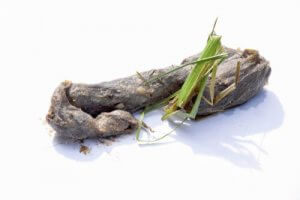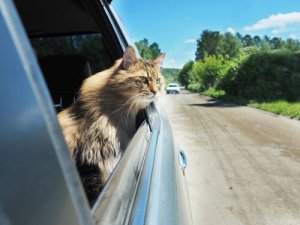Sickness and Nausea in Cats: Causes and Treatment

Nausea in cats – and subsequent vomiting – is controlled by a very complex coordinated reflex, that causes the animal to bring up the contents of its stomach. This reflex is regulated by a group of neurons located along the length of the encephalic trunk, a structure of the central nervous system that links the brain and the spinal cord.
These neurons can be activated by a variety of different stimuli, both internal and external. When stimulated, they send a signal to the stomach, which starts to spasm, making the animal feel nauseous, and causing it to vomit.
The difference between vomiting and regurgitation
Cats are expert regurgitators, so it’s important to be able to distinguish between the two. Regurgitating occurs when an animal brings up undigested food, while vomiting involves bringing up partially digested food that was contained inside the stomach. Additionally, vomiting is usually caused by some external factor.
Regurgitation is a cat’s ability to expel undigested substances, whether they’re at the back of the mouth, in the esophagus, or in the stomach. Cats normally regurgitate in order to get rid of hairballs, which form in the digestive tract after regular grooming.

If you think your cat may have a hairball, it’s important to give it catnip or cat grass. This will encourage its digestive tract to pass the hairball instead of regurgitating it.
Causes of nausea in cats
In simple terms, nausea in cats is defined as stomach discomfort which leads to vomiting. Any conditions which can cause damage to the stomach and gastric glands can also cause nausea.
Pregnancy
Just like other mammals, pregnancy in cats can cause nausea. This is due to a number of reasons, such as hormonal changes, fatigue, or to avoid ingesting food that’s dangerous for the unborn kittens.
Car journeys
Some cats can suffer from car sickness when traveling long distances. This is because the vestibular organ, which is responsible for balance and orientation, starts to send a wave of signals to the brain. The brain can’t cope with the overload of information, causing the cat to feel dizzy and nauseous.

Acute gastritis and nausea in cats
Acute gastritis in cats can also result in nausea. This illness causes irritation and, in some cases, damage to the stomach lining. As a result, it will try to avoid digesting any food it receives, and will vomit it up instead.
Pancreatitis and other pancreatic conditions
The pancreas has an exocrine function, which means it secretes enzymes that help to digest food. When the pancreas isn’t functioning properly, it stops secreting these enzymes, and the food can’t be fully digested. The stomach will then try to expel the undigested food.
Toxic substances
The ingestion of toxic substances, such as house plants, poison, or cleaning products, can cause extreme nausea and vomiting.
Strong smells
Some smells, including citrus fruits, acetate and toothpaste (among others) can cause nausea in cats that are particularly sensitive to smells.
Nausea in cats – treatment
In order to treat nausea in cats, the first thing you need to establish is the cause and, if possible, eliminate it.
Generally, treatment for nausea involves administering an anti-emetic, a drug that reduces the peristaltic movements of the digestive tract.
In cases where damage to the stomach lining is the cause of the nausea, your vet may recommend a change of diet, or a 24-hour starvation period. This reduces the amount of food matter in the intestines, allowing it to relax, and the gut flora to recover.
Before administering any kind of treatment, you must talk to your vet. They can provide the best diagnosis and treatment plan for your pet.
All cited sources were thoroughly reviewed by our team to ensure their quality, reliability, currency, and validity. The bibliography of this article was considered reliable and of academic or scientific accuracy.
- El patrocinio de ZOETIS, C. (2014) Aproximación al manejo del vómito en gatos.
- García Mitacek, M. C., Stornelli, M. C., Tittarelli, C. M., Núñez Favre, R. D. L. Á., Williams, S. I., Sota, R. L. D. L., & Stornelli, M. A. (2012). Interrupción de la gestación en la gata doméstica: actualización bibliográfica. Analecta Veterinaria, 32.
- Margarita, R. I. A. (2001). Manual de gastroenterología de perros y gatos.
